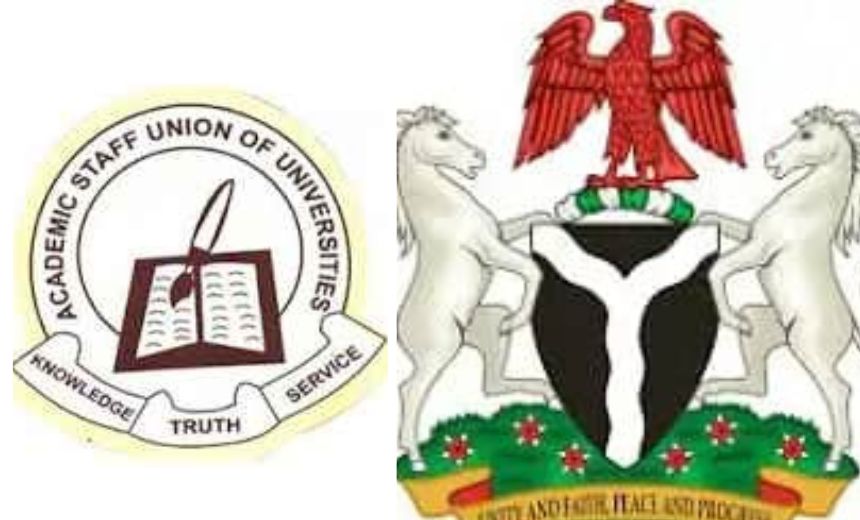Despite last minute marathon meetings with stakeholders by the Minister of Education, Dr. Tunji Alausa, the Academic Staff Union of Universities, ASUU, on Sunday declared a two-week total and comprehensive warning strike across all public universities in Nigeria.
ASUU President, Professor Chris Piwana at a news briefing in Abuja on Sunday said it goes without saying that there is nothing sufficient on ground to stop the implementation of the ASUU national executive council’s resolution to embark on a two-week warning strike at the expiry of the 14-day notice issued on September 28, 2025.
It is a litmus test for the new ASUU president, Professor Piwana, as he instructs all branches of the union to withdraw their services with effect from midnight on Monday, October 13.
Piwana said the warning strike shall be total and comprehensive as agreed at the last NEC meeting.
Some reasons for the industrial action include; non-release of earned academic allowances, delayed revitalisation funds release for public universities, withheld salaries, review of lecturers’ welfare packages and the renegotiation of 2009 FGN-ASUU agreement.
The latest standoff between the university lecturers and the Federal Government comes despite ongoing negotiations aimed at averting another round of industrial action in the country’s tertiary institutions.
On Wednesday, the Minister of Education, Dr. Alausa, said in Abuja that the government has entered the final phase of talks with ASUU and other tertiary institutions’ unions to resolve lingering disputes over welfare, funding, and the implementation of the 2009 ASUU-FGN Agreement.
MUST READ: ASUU Urges Tinubu to Keep promise of preventing strike in Tertiary institutions
Alausa noted that the President Bola Tinubu administration has already made significant progress with the release of N50 billion for the payment of Earned Academic Allowances, while another N150 billion has been captured in the 2025 budget for needs assessment, to be disbursed in three tranches.
The news of ASUU strike will further affect resumption dates in most public universities, as most had fixed October to begin academic activities. The strike is expected to affect freshly admitted students who must have thought that the “no-strike” declaration by candidate Bola Tinubu in the 2023 election campaigns would favour them.
Meanwhile, Minister of Education, Dr. Tunji Alausa and the Minister of State for Education, Professor Suwaiba Ahmed, have jointly reaffirmed the unwavering commitment of the Federal Government to constructive engagement with the Academic Staff Union of Universities,ASUU, towards the sustainable resolution of all outstanding issues affecting the university system.
The Ministers stated that the Federal Government has demonstrated sincerity, patience, and goodwill in its dialogue with ASUU, noting that virtually all the concerns raised by union have been addressed.
These include the introduction of a big percentage of teaching allowance and significant improvements in the conditions of service of academic staff.
The few remaining matters are those that rightfully fall within the jurisdiction of the governing councils of the respective universities, which have been recently reconstituted to handle such internal issues.
They noted that, though the government is making all efforts to resolve all the issues and ensure that students remain in school, ASUU is not operating with the same zeal. The government has met the deadline for presenting its position to the union as agreed, yet instead of reverting to the Ministry in continuation of dialogue, ASUU has chosen to proceed with strike.
This action, the Ministers observed, does not reflect a spirit of cooperation or fairness to the students and the public, especially given government’s demonstrable commitment and concrete steps already taken.
The Ministers further stressed that the government has continued to prioritise the welfare of university staff and the stability of the academic calendar under the Renewed Hope Agenda of President Bola Tinubu. According to them, dialogue remains the most effective and sustainable path to resolving disagreements, and government remains open to engagement at any level to prevent unnecessary disruption in the education sector.
They, however, emphasised that the “no work, no pay” policy remains an extant labour law of the Federal Republic of Nigeria, and the government will be guided by this law should academic activities be disrupted in the country’s universities. While government continues to demonstrate goodwill and flexibility, it will not abdicate its responsibility to uphold fairness and accountability in the use of public resources.
The statement reassured Nigerian students, parents, and the general public that the Federal Government is firmly committed to maintaining industrial harmony in the tertiary education system.
The Ministers appealed to all academic unions to embrace partnership and dialogue rather than confrontation, in the collective interest of the country’s higher education system.
They reiterated that the government’s education reform agenda is designed to enhance teaching and research conditions, promote institutional autonomy through strengthened university governance, and ensure that the academic community thrives in an environment of mutual respect, productivity, and innovation.
The Ministers reaffirmed the commitment of the Federal Government to work with all stakeholders to safeguard the academic calendar and prevent further disruption in the learning process. They urged ASUU to reconsider its position and return to dialogue in the best interest of students and the future of Nigeria’s education.
(Editor: Terverr Tyav)








